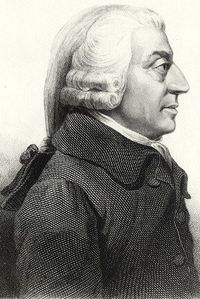In my Wall Street Journal op/ed on the 3 Nobel Prize winners, “A Nobel Prize in Economics for the ‘Inclusive’ Free Market,” published on line on the afternoon of the award and in print the next day, I wrote:
The Nobelists’ contribution is to lay out empirical data on the specific economic institutions that helped or hindered economic growth and then to examine the factors that led to those institutions. They point out, as Adam Smith did, that property rights and the rule of law are key.
What I didn’t get room to say, given my tight word constraint, is that in their book Why Nations Fail, Daron Acemoglu and James A. Robinson gave short shrift to Adam Smith. Look up Smith in the index, and you’ll find one reference. Go to that page and you’ll see that the reference is to the “invisible hand.” That’s it. No mention of institutions, which is a huge part of An Inquiry into the Nature and Causes of the Wealth of Nations. And there’s no mention of The Wealth of Nations in the 17 pages of References.
I was looking at the blurbs at the front of the book this morning and found this one by Niall Ferguson:
Synthesizing brilliantly the work of theorists from Adam Smith to Douglass North with more recent empirical research by economic historians, Acemoglu and Robinson have produced a compelling and highly readable book.
Acemoglu and Robinson do discuss recent empirical research by economic historians. The book is compelling and highly readable and their bibliographical essay references a number of works by Douglass North.
But the authors did not mention the work of Adam Smith. I gave above the only mention of Smith that I could find.
Postscript:
Since writing my op/ed, I came across this piece by Ryan Young of the Competitive Enterprise Institute. It’s excellent.


READER COMMENTS
Roger McKinney
Oct 17 2024 at 10:24pm
I thought Why Nations Fail was pro free market. The criticisms of the US in the last chapters seemed out of place. I’m guessing he had to do penance with his later books to get the prize.
Charles Courtney
Oct 20 2024 at 11:12am
Markets are not free. There is concept known as transactions costs popularized by Ronald H Coase. See Nature of the Firm and The Problem of Social Cost. Incidentally price system is language connecting consumers and producers. Regulate market conduct but not price as cannot see consumer’s preference function nor producer’s production function. Much of economics consists of what Peter Bauer termed priceless economics. Medicare like higher education (sic) has never been properly priced. Hayek in Use of Knowledge in Society (1945) proved price system is communication device. Hayek like Friedman never recognized money’s cultural and historical significance. This is because modern man has historical amnesia. Only Peter Bauer of LSE recognized this fact.
Thomas Strenge
Oct 22 2024 at 1:43pm
Of course markets aren’t free if you mean gratis. They are supposed to be free from government interference. That’s what the free in free market means.
Jim Glass
Oct 20 2024 at 9:38pm
I don’t see the point, why would they? I’ve read a lot of physics books that don’t mention Newton. Anyhow, I just came upon Acemoglu speaking to Hoover two months ago…
As far as imputations that he is some sort of language-twister in furtherance of ideological statism, he approaches this head on. (The statism, not the language twisting.) Speaking of regulation and where ‘the line should be drawn’…
MarkW
Oct 21 2024 at 4:29pm
There have been a number of cringeworthy bits from Acemoglu lately. From Ryan Young’s linked article:
Acemoglu argues. In a 2023 Twitter thread about artificial intelligence, he writes: “Coming back to Hayek’s argument, there was another aspect of it that has always bothered me. What if computational power of central planners improved tremendously? Would Hayek then be happy with central planning?”
Ugh. As Young points out, the issue isn’t really calculation, it’s information. The problem is that the relevant knowledge is widely distributed among countless individuals, and it is often in the form of tacit knowledge or procedural knowledge that individuals can readily use but cannot express — they couldn’t provide it to an all-seeing central planner even if they wanted to. Powerful computers didn’t change the situation for the ‘socialist calculation problem’ and powerful AI can’t possibly make a difference either.
Thomas Strenge
Oct 22 2024 at 1:45pm
Excellent observation. One wonders if much like Krugman the pundit, Acemoglu the economist will sell himself to be better liked.
Comments are closed.